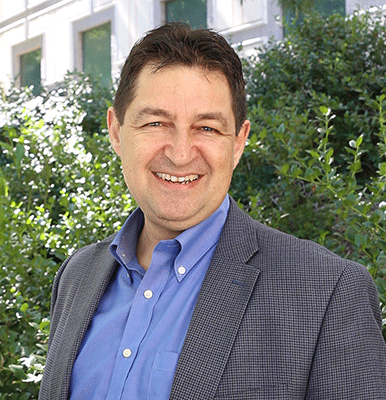NSF Grant Advances 3-D Microelectrodes
 Oct. 2, 2017 - Lawrence Kulinsky, a project scientist in the Samueli School’s Department of Mechanical and Aerospace Engineering, has received a National Science Foundation grant to characterize and model a new micromanufacturing process. The three-year, $300,000 funding will jumpstart a new system for inexpensively mass-producing 3-D microelectrodes for scientific and engineering applications.
Oct. 2, 2017 - Lawrence Kulinsky, a project scientist in the Samueli School’s Department of Mechanical and Aerospace Engineering, has received a National Science Foundation grant to characterize and model a new micromanufacturing process. The three-year, $300,000 funding will jumpstart a new system for inexpensively mass-producing 3-D microelectrodes for scientific and engineering applications.
Three-dimensional microelectrodes have a wide range of applications in electronics, power conversion and storage, sensors and lab-on-a-chip assemblies. They can be more efficient than 2-D electrodes, but with current technology requiring manual assembly, they are difficult, time-consuming and expensive to produce.
Kulinsky’s approach, called dielectrophoretic electropolymerization, enables easily scalable, cost-effective mass production. The method can yield 3-D electrodes patterned with micro-particles or aligned nanotubes, and it is expected to be used to create new photonic devices and whole-cell biosensor platforms for study of water quality and drug discovery.
Kulinsky began developing this new process in his lab alongside two graduate students, and the technology was patented in 2016.
The NSF-funded project will utilize undergraduate and graduate students from UCI, as well as Saddleback and Mt. San Antonio community colleges to model and test the system.
Additionally, the funding enables Kulinsky to conduct outreach. He and the project’s graduate students will mentor teachers from middle and high schools in underrepresented areas of Los Angeles, making monthly visits to these schools to share their work. Kulinsky received “overwhelming student interest” when he previously presented his research at schools with a large percentage of underrepresented students. “This will have an even stronger impact when undergraduate students (who will be closer to the age of their audience) speak of their involvement in science and technology research,” he said.
Kulinsky is pleased with his award and anxious to get started. “This study will answer some very important fundamental questions in order to develop technology for electrokinetic microassembly, which will allow for mass-scale manufacturing of devices from micro- and nanocomponents," he said.
-Anna Lynn Spitzer
